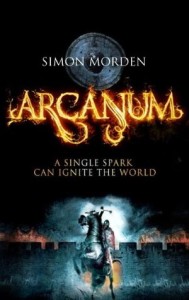
by Simon Morden
Originally scheduled for release last November, Arcanum by Simon Morden is fantasy/alt-history novel set in medieval Carinthia. The publication date was later set to January 28th to be published by Orbit, a part of Hachette Book Group in the US and Little, Brown Book Group in the UK. The novel starts in a palatinate which is indirectly governed by magic. Regular daily functions are made easier by the use of magic -magical lights, boat steering, water- and it is just about necessary for day to day life. Magic is not a skill everyone posses, nor is is simply innate abilities that grants one powers. You can tell a hexmaster (sorcerer) by their white robes. Also, any exposed skin is sure to be covered in tattooed spells. The hexmasters of The Order are extremely powerful and rightfully feared across Europe.
This, however, is not Arcanum’s story. It is a story about challenges. After centuries, the magic stops working. The magic does not just stop working overnight, though for the people, it may as well have. For Carinthia, this provides a unique challenge of how to readjust to life without magic and without hexmasters. People are so dependent on magic, it would be the same as if our power suddenly stopped working, not even batteries or generators. Things that were taken for granted, just cease to function. Needless to say it is a lot a cope with. The book combines that fantasy action scenes with alternative-historical looks at the political situations arising from the newly magic-free world. I have to admit that it took a while to build, but eventually it got to a really good pace.
The story follows several characters, too many to consider any of them the main characters. The major players come from several areas. The Prince certainly one of the central characters, while most of the others work for him in some way. His huntmaster Peter Büber, librarian Frederik Thaler, and fellow book-lovers Sophia Morgenstern and her father Aron, (local Jewish residents of a pagan town) serve the predominate major roles as do members of the Order, depending on how far into the book you are. Without getting too involved in the story and revealing anything, I will simply say there are at least two or three other major roles at any given time, though some are dynamic. The novel is broken up into three parts and they really did feel like three distinct books in a series.
The school of magic in the beginning of this story is very original, and that is something always appreciate. In all honestly, I do wish it existed a bit longer. I felt that our exposure to it was way too short. I really appreciated the political aspects though. The way the author addresses hoe the palatinate deals with the issues that arise, including public works, economics and military considerations, really interested me. I know that this is not uncommon in fantasy books, but perhaps it is the fact that we are talking about real places that added to it for me. I felt that most of the battles were well done. There was one however that I felt was too short and should have ended more fantastically.
I appreciated the depth of characterization in a number of the characters, though I think there were too many major characters to develop them equally. It was already not a short book. The array of characters did make for interesting dynamics, shifting favor and some well engineered disappointment. I think the Librarian and huntmaster stood out to me the most. The role of the library in general (again, to me at least) was great. As a lover of books, science and history, it appealed to many of my interests.
The messages relating to struggles and overcoming certain issues were ever present and sometimes I thought were a bit strong. I get the re-adjusting, the fighting, and the civil issues. I felt though that the religious issues were a bit too overt and in your face. Messages are laced into many stories, but I prefer that as an undertone as opposed to put right out in front. I understand the purpose and through my own family’s religious background I completely relate. It just seemed a little forced at times. In some segments it fit very well with the story, other times it seemed more like the author was just reminding us. I did appreciate the care taken in language and the accuracy of the belief structures.
I found it somewhat difficult to come up with a rating for this book. I did like the book quite a bit. It is absolutely something I would recommend. Could I keep reading it all night? Yep, certainly could. Was it something I absolutely could not put down and needed to see what happened next? No not really. The slower beginning and some rushed or abrupt scenes took a little away from it in my opinion, so i would have to say 3.5/5 would be a fair rating in my eyes. Still very good and worth picking up.
Check out a preview here on the publisher’s website: Excerpt
